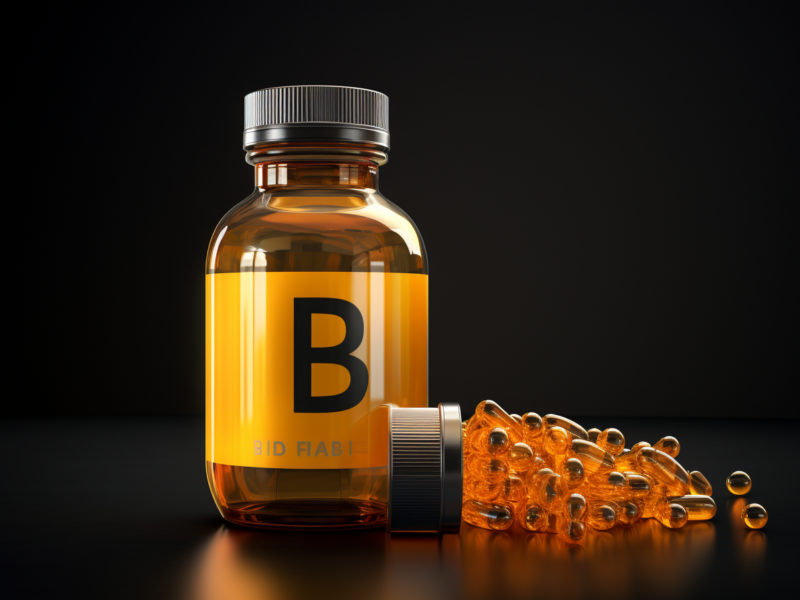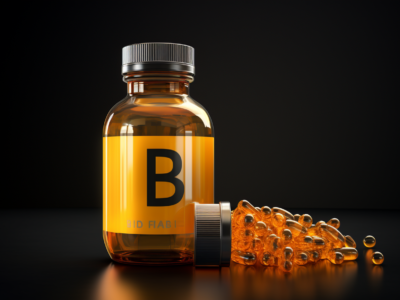Vitamin B is a group of essential nutrients that play an important role in the proper functioning of our body. From energy production to brain health, Vitamin B has many benefits for physical and mental well-being. However, as with any supplement or medication, there are potential side effects and interactions that should be considered before adding Vitamin B supplements to your diet. In this article, we will explore the risks associated with excessive intake of certain types of Vitamin B and how they can negatively impact your health. We will also discuss the importance of being aware of possible interactions between different vitamins and other substances such as medications or alcohol which may affect their effectiveness or cause adverse reactions.
Understanding Vitamin B and Its Benefits
Vitamin B is a group of water-soluble vitamins that are essential for various bodily functions. They have numerous benefits ranging from maintaining healthy skin, aids in the production of red blood cells, and regulate metabolism. The eight B-complex vitamins include thiamin(B1), riboflavin (B2), niacin (B3), pantothenic acid(B5), pyridoxine (B6), biotin(B7) folic acid(B9) and cobalamin (B12). These vitamins work together to maintain optimal health.
 However, an excessive intake of certain types of Vitamin B can lead to potential side effects such as flushing, itching or hives on the skin. In addition, it may negatively affect those with medical conditions such as liver disease or disorders related to thyroid function.
However, an excessive intake of certain types of Vitamin B can lead to potential side effects such as flushing, itching or hives on the skin. In addition, it may negatively affect those with medical conditions such as liver disease or disorders related to thyroid function.
It is important to be aware of these risks before adding vitamin supplements to your diet.
In conclusion, incorporating a proper amount of Vitamin B into your diet through foods or supplements can yield multiple positive benefits for our physical and mental well-being.
However, it is crucial to understand what type of vitamin supplementation would best complement individual dietary deficiencies while being conscious about the possible negative effects associated with supplementation beyond recommended levels.
Potential Side Effects of Vitamin B Overdose
When taken in normal doses, Vitamin B is generally safe and well-tolerated by the body. However, an overdose of certain types of Vitamin B can lead to adverse side effects that negatively impact your health. High doses of Vitamin B3 (niacin) can cause flushing, itching, skin irritation, and liver damage. An overdose of Vitamin B6 (pyridoxine) can result in nerve damage and numbness in the hands and feet.
It’s important to note that overdosing on vitamin supplements is rare and usually occurs when taking high amounts for an extended period. It’s also possible to consume too much through your diet if you eat a lot of foods fortified with vitamins or take multiple supplements at once. Additionally, interactions between different types of Vitamin Bs may occur which could lead to adverse reactions such as nausea or headaches.
In conclusion, although it is essential for our overall health and wellbeing, like any medication or supplement, excess dosage intake without proper consultation with a healthcare provider might have potential side effects causing short term/ long term harm leading to serious complications or disorders.
Navigating Vitamin B-Related Interactions with Medications
Navigating Vitamin B-related interactions with medications requires careful consideration and consultation with a healthcare professional. Certain types of Vitamin B, such as B6 and B12, can interact with certain medications that treat conditions like high blood pressure, diabetes, or seizures. In some cases, this interaction may reduce the efficacy of the medication or even cause adverse effects like nerve damage.
Furthermore, excessive intake of certain types of Vitamin B can also have negative effects on one’s health. For example, taking too much Vitamin B6 can result in neurological symptoms like numbness in the hands and feet. It is recommended to consume no more than 100mg per day from supplements unless advised by a doctor otherwise.
In conclusion, while there are many benefits associated with including Vitamin B in your diet or supplement regimen, it is important to be mindful of potential interactions when taking other medications and avoid excessive intake. Always consult a healthcare professional before adding any type of supplement to your routine for optimal safety and health outcomes.
The Risks of Vitamin B Deficiency and Overconsumption
There are risks associated with both a deficiency and overconsumption of Vitamin B. A deficiency in this essential nutrient can cause fatigue, weakness, poor cognitive function, and anemia. Certain populations such as vegans, elderly individuals, and those with certain medical conditions may be at higher risk for Vitamin B deficiencies.
 On the other hand, consuming excessive amounts of certain types of Vitamin B can also be harmful. For example, too much Vitamin B6 can lead to nerve damage and skin lesions while overdosing on niacin (Vitamin B3) can cause flushing or liver toxicity. Therefore, it is vital to speak with a healthcare provider before beginning any new supplement regimen to ensure proper dosing and avoid potential negative consequences.
On the other hand, consuming excessive amounts of certain types of Vitamin B can also be harmful. For example, too much Vitamin B6 can lead to nerve damage and skin lesions while overdosing on niacin (Vitamin B3) can cause flushing or liver toxicity. Therefore, it is vital to speak with a healthcare provider before beginning any new supplement regimen to ensure proper dosing and avoid potential negative consequences.
Safe Dosages for Different Types of Vitamin B
Safe dosages for different types of Vitamin B are crucial to maintain optimum health and avoid potential side effects. The recommended daily dosage for most adults is 1. 3-2. 4 mg of thiamine (B1), 1. 7-2. 6 mg of riboflavin (B2), 14-100 mcg of cobalamin (B12), and 30-500 mcg biotin (B7).
It is important to note that excessive intake of individual Vitamin B can lead to adverse reactions such as nausea, vomiting, and diarrhea. For instance, prolonged use or high doses above the tolerable upper limit could result in vitamin B6 toxicity causing neurological symptoms like numbness or clumsiness.
It is therefore essential to consult a healthcare provider before taking vitamin supplements if you have any underlying medical conditions or take prescription medications that could interact with these supplements negatively. In summary, safe dosages should be followed when taking various types of Vitamin Bs according to their recommendations so as not suffer from severe side effectsincluding possible interactions with other drugs if taken without professional guidance.
Vitamin B Supplements vs Natural Sources
When it comes to getting our daily dose of Vitamin B, we have two options: supplements or natural sources. Vitamin B supplements contain concentrated amounts of specific types of Vitamin B and can be helpful in addressing deficiencies. However, relying solely on supplements may not provide the full spectrum of nutrients found in natural sources. Natural sources such as meat, fish, dairy products, leafy greens and legumes are rich with various forms of Vitamin B like thiamin (B1), riboflavin (B2), niacin (B3)and folic acid (B9). Consuming a diverse range of these foods promotes optimal health – both physically and mentally.
It is important to note that excess intake of certain types of Vitamin B can lead to potential side effects and interactions. For example, high doses of vitamin B6 over long periods may cause nerve damage leading to numbness or tingling sensations in limbs. Additionally, combining certain prescription medications with vitamin supplements can also have negative consequences such as decreasing effectiveness or toxicity. Therefore it is always recommended consulting your healthcare provider before adding any new supplement regime into your diet.
Best Practices for Incorporating Vitamin B into Your Diet
When it comes to incorporating Vitamin B into your diet, there are a few key best practices that should be followed. First and foremost, it is important to choose the right sources of Vitamin B for your needs. For example, Vitamin B12 can be found in animal products such as meat and dairy, while folate can be found in leafy green vegetables.
It is also essential to ensure that you are getting enough of each specific type of Vitamin B. This can typically be achieved by eating a varied diet that includes plenty of fruits and vegetables along with other nutrient-dense foods.
Additionally, if you decide to take supplements or add fortified foods to your diet, it is important to do so under the guidance of a healthcare professional. They will help determine what types and doses of Vitamin B are right for you based on your health history and individual needs.
By following these best practices, you can safely incorporate Vitamin B into your diet without risking potential side effects or interactions with other medications or supplements.

Summary
In conclusion, although vitamin B has many potential health benefits, there are also possible side effects and interactions to be aware of. Some individuals may report side effects, such as digestive issues or skin rashes, when taking vitamin B supplements. It is important to monitor one’s B12 levels, as too much or too little can lead to adverse effects. If any side effects occur, it is recommended to report them to the FDA at 1-800-FDA-1088. Additionally, it is important to note that certain medications can interact with vitamin B supplements, so it is always best to consult with a healthcare professional before starting any new supplement regimen. Oral vitamin B supplements may also be less effective for those with poor nutrient absorption or certain health conditions. Overall, while vitamin B can be a beneficial nutritional supplement for many people, it is important to be aware of the possible side effects and interactions and to always consult with a healthcare provider before starting any new supplement program.
Questions & Answers
Q: What are B vitamins?
A: B vitamins are a group of essential nutrients that are important for many bodily functions. They include B1, B2, B3, B5, B6, B7, B9, and B12.
Q: What is Vitamin B12?
A: Vitamin B12 is one of the B vitamins, and it plays an important role in the formation of red blood cells and in maintaining the health of nerve tissue.
Q: What are some potential side effects of Vitamin B?
A: Some people may experience side effects after taking B vitamins, including nausea, vomiting, diarrhea, stomach upset, and headaches.
Q: What should I do if I miss a dose of my Vitamin B supplement?
A: If you miss a dose of your Vitamin B supplement, take it as soon as you remember. However, if it is almost time for your next dose, skip the missed dose and take your regular dose as scheduled. Do not take a double dose to make up for a missed one.
Q: Can taking too much Vitamin B be harmful?
A: Yes, taking too much Vitamin B can be harmful. High doses of Vitamin B6, for example, have been linked to nerve damage. Always follow the recommended dose on the label of your supplement or as directed by your doctor.
Q: Are there any food sources of Vitamin B?
A: Yes, there are many foods that contain B vitamins, including meat, fish, poultry, eggs, dairy products, whole grains, and leafy greens.
Q: Can B vitamins interact with certain medicines?
A: Yes, B vitamins can interact with certain medicines. For example, some antibiotics and seizure medications can reduce the amount of Vitamin B6 in your body. Always tell your doctor or pharmacist about all the medications you are taking, including supplements.
Q: Is it safe to take Vitamin B supplements during pregnancy?
A: Yes, it is generally safe to take Vitamin B supplements during pregnancy, but you should talk to your doctor before starting any new supplements.
Q: Are there any warnings or precautions I should be aware of before taking Vitamin B supplements?
A: Yes, there are some warnings and precautions to be aware of before taking Vitamin B supplements. For example, people who are allergic to cobalt may have an allergic reaction to Vitamin B12 supplements. Always read the label and follow all directions. If you experience any side effects, tell your doctor or report them to the FDA.
Q: Are Vitamin B supplements suitable for vegetarians and vegans?
A: Yes, there are vegetarian and vegan options for Vitamin B supplements. Some products are made from plant sources, such as algae, and are suitable for people who follow a plant-based diet.
Q: What is Cyanocobalamin?
A: Cyanocobalamin is a form of Vitamin B12 that is often used in supplements and injections to treat Vitamin B12 deficiency.



 Choosing And Using The Right Vitamin B Supplements For Your Needs
Choosing And Using The Right Vitamin B Supplements For Your Needs
